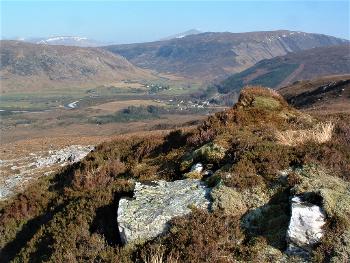Kinlochewe workshop to focus on catchment-scale vegetation restoration in response to climate change and biodiversity conservation challenges
Posted: Tuesday 28 March, 2023 @ 14:36:18

25th & 26th April, Kinlochewe (by Beinn Eighe National Nature Reserve), Wester Ross
High on the international agenda, including for people living in Scotland, is the need to be able to adapt at landscape-management scales to changes in weather patterns associated with climate change.
Large parts of Wester Ross and other upland areas in Scotland have supported grazing by cattle, sheep and deer over centuries for livestock production or to support deer stalking. Long-term consequences for upland landscapes include changes in vegetation cover and composition (not just trees), thinner organic ‘soil’ layers, and the reduced ability of river catchment areas to soak up, retain and slowly discharge rainwater during intensive rainfall events.
This workshop will focus upon future management of upland ecosystems to conserve and support biodiversity, wildlife and livestock production, to sequester carbon, to reduce flood risk, and to benefit wild salmon populations in the streams and rivers of Wester Ross.
The meeting will take place over two days:
25th April: walk up the Pony Path at Beinn Eighe NNR, 11am to 4pm to trial plots fertilised with phosphate fertiliser by Donald McVean in 1961. What have the long-term impacts of this action been on vegetation cover, biodiversity, carbon sequestration and the ability of ground to retain and slowly discharge rainwater? We will also revisit nearby areas where trees have been planted and some of the mossy ‘hummocks’ (nutrient hot-spots) used by birds and other animals to learn about transfer of phosphate within the ecosystem, associated biodiversity and vegetation growth. Beinn Eighe NNR at 11am – 4.30pm; plans may change pending weather forecasts.
26th April: workshop in Kinlochewe Village Hall, 10.30am to 4pm, live-streamed for those unable to attend in person
The workshop will focus on:
- Vegetation cover from riversides to mountain tops: what is natural? What is desirable?
- Management of upland areas for sheep and red deer production
- Human ecology of phosphorus [the life (& peat formation?) - limiting nutrient] availability in upland landscapes
- Peatland restoration and woodland restoration in Wester Ross area to protect rivers: practical examples
- Contrasting land management objectives: finding common ground
Participants will likely include Peter Cunningham (Biologist, Wester Ross Fisheries Trust), Colin Morrison (Angus Davidson Ltd – peatland restoration), Malcolm Turner (The Woodland Trust), Mark Williams (Inverasdale Estate), Alasdair Macdonald (head keeper, Dundonnell estate), Doug Bartholomew (Beinn Eighe NNR), Neil Morrison (head-keeper, Coulin Estate), Finlay Owen (deer stalker and fisheries manager, Gairloch Estate) and we hope many other people with first-hand practical knowledge of land management, ecology of upland vegetation, future challenges and opportunities.
See also https://www.wrft.org.uk/news/newsitem.cfm?id=241
For further information, please contact Peter Cunningham (biologist), Wester Ross Fisheries Trust info@wrft.org.uk 07786 836 003